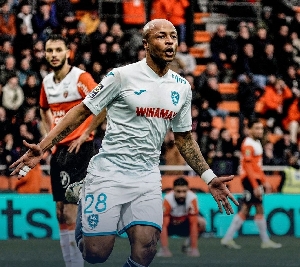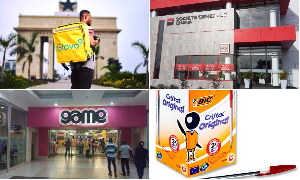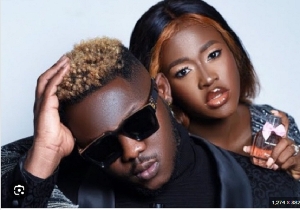Politics of Monday, 13 August 2007
Source: Qanawu Gabby
Feature: 2009 is not about continuity but change
In 2008, Ghanaians will be presented with a straight choice. 8 years of NDC; followed by 8 years of NPP. Which of the two parties should be given another chance? Should we not bring back the NDC? What new can the NPP offer? Regardless of the all-can-see achievements over the last 8 years, those achievements alone may not be enough for the voter to stick to the NPP. Memories can be short.
The negative tends to linger longer in the memory bank than the positive. No government can stay in power without tripping on the livewires of scandals and matters deserving of being used negatively as an electoral issue against it. The opposition may have an easy task at presenting a sexier alternative. It can do a better job at bashing government with facts of currency and at the same time presenting an alternative.
The persuasive force of voices like Ayariga, Asaga, Kunbuor, Bagbin, Haruna and Mahama may just be too powerful to resist.
How does the NPP present itself as able to meet the challenges of post-Kufuor Ghana without being too counter-productively self-critical?
The difficulties of the incumbent can be detected in the campaign messages of several of the 17 NPP aspirants. Notable exceptions are returnees Boakye Agyarko and Arthur Kennedy.
The two have not been part of the NPP government and therefore feel freer to criticise Kufuor's shortcomings and offer solutions if elected to lead. For, the other candidates, the recurring theme appears to be one of continuity. Though, Kufuor is no longer in a position to threaten them with a reshuffle, they are still reluctant to present a clean break front to the electorate. But, should the other candidates really feel limited in showing what their leadership would entail? Maybe the issue is not so much an issue now in the internal fight to become the party's presidential candidate.
But, even then those seeking to take over must be able to show not only how they can build on what has been done by President Kufuor, but also how they can make a difference and with different kind of leadership they can bring to bear on this country. They should not be shy to say so or show the kind of difference they can make.
They should not be imprisoned by the sensibilities of Kufuor. It is, of course, not useful to the very vehicle they seek to be a driver of in the December 2008 elections, to concentrate on criticising this government.
But, you can’t also pretend that Kufuor is the best thing that happened to Ghana since banku and tilapia. Even banku and tilapia have bones and sometimes lumps.
Every government has flaws. It takes leadership and courage to acknowledge the flaws and offer solutions.
The aspirants should not be afraid to show to Ghanaians, including NPP delegates how they will do things differently. The President may not like it. But, the task of leading this country after December 2008 is more important than tweaking the G-spot of Kufuor the wrong way. We want to hear not necessarily their detail ed policies but the ideas that they have for this country.
What Ghanaians are looking for after 2008 is not continuity. If so, then let us have a referendum on increasing the presidential terms.
The NDC tried the continuity thing in 2000 and lost. We must feel the unique contribution that whoever is elected can bring on board. What is required is not simply to design posters making wild boasts on what you think you can do if elected.
That would not fly. We want to hear a deeper understanding of what confronts this country and inspiring ideas on how to tackle them.
We can only begin to radically solve our problems with the kind of resolute leadership that can get people to do what they have to do. Kufuor has done his bit - and a very big bit at that.
But, certainly we don’t want a continuity of the Kufuor agenda. It is not challenging enough. We want change: a combination of the Nkrumah vision and the Danquah-Busia grasp of practicalities, individual responsibility and empowerment.
The significance of Ghana’s golden jubilee anniversary should not be lost on Ghanaians. Nkrumah, initially, took charge of the business of government from 1951 to 1957.
This was a period of transition from colonial rule to independence. A comment by Nkrumah’s contemporary, a senior British politician of the Labour party, Herbert Morrison (Foreign Secretary in 1951) said it all: To give a colony like Ghana independence would be "like giving a child a latch-key, a bank account and a shot-gun."
Nkrumah’s response was "We prefer self-government with danger to servitude in tranquillity." We have had the latch-key and showed our weaknesses and potential. We have misused the gun and the bank balance. But, we have the benefit of hindsight and the advantage of a highly educated crop of leaders, who only need to be empowered to act.
The first three years of independence was the period which saw Ghana boldly charting her own course of self-determination.
We had become a Republic in 1960; we had a strong, charismatic, inspiring, determined visionary leader in Kwame Nkrumah; the rest of the continent looked up to us; mass education was prioritised; planned economy was in place; massive infrastructural development; import substitution kind of industrialisation was in place. It was all too good to be true.
The government had vision and conviction but not the experience of hindsight to guide it. The first sub-Saharan country to break free from colonial shackles had to rely on its own ingenuity and impulses; particularly in the advent of the Cold War.
Five things that can be said to have allowed the reversal of the kind of rapid progress Ghana was set to make were (1) the unhealthy relationship between Government and Opposition, (2) the governing CPP and the Opposition not being on the same side of the Cold War (or the CPP not opting for the more committed pro-Western alternative), (3) weak institutions of state, (4) weak indigenous private sector, and (5) Nkrumah’s own low regard for the doctrine of rule of law.
Fifty years on, the obvious questions are: are things different now in 2007 to what they were in 1957; what has changed significantly under the first six years of the Kufuor government, prior to Ghana’s 50th anniversary; are we travelling at a pace that can resurrect the dream that died, the hopes that decayed and the opportunities wasted? Are we more united today than we were under Nkrumah? We have made some progress. But, by no means far enough. Six years before independence Nkrumah and his team were presented the chance through the free will of Ghanaians to bring advancement to Ghanaians.
The bottom line was that their project of high hopes eventually was derailed. Six years before Ghana’s Golden Jubilee anniversary, the baton of leadership now went to the historical local adversaries of the Nkrumaists, the Danquah-Busiasts.
Though, there is an election in 2008, there is every opportunity for the New Patriotic Party to retain power. The issue is on what programme do they persuade Ghanaians to give them another go at the presidency? Is it to be on a platform of continuity or change? The signs are very symbolic for the post-Kufuor era to be one of radical positive change, guided jealously and uncompromisingly by the principles of good governance.
Such a radical change implies it is not to be achieved by force but by inspired leadership. By the kind of leadership that can command universal respect, appreciation and commitment from all Ghanaians.
John Agyekum Kufuor was certainly the right man for the first eight years after Jerry John Rawlings. He has more than stabilised this country and given it the kind of optimistic platform not seen before since 1957.
But, Kufuor is no Nkrumah – Kufuor has the blessings of this country’s negative experience to avoid; he has the maturity Nkrumah lacked; but his leadership has not generated the kind of excitement, of hope, of expectation that the new independent country had, that Nkrumah was able to ginger.
If he has Nkrumah’s vision then Kufuor’s difficulty has been on how to articulate it to get the nation to follow him on that vision trek. Yet, Kufuor has managed to lay a more solid foundation for a population that is about four to five times as large, but facing newer but basically similar challenges of old. The country is arguably more divided today than it was in the past. One can seek to explain it away by saying such are the hazards of competitive politics. Such are the aftermaths of widening the frontiers of freedom.
But, Qanawu is not entirely convinced. There is a worrying aspect of our politics which if not checked could seriously hamper any attempt at radical change for the better.
We do not only need a candidate who can unify the NPP after next December, but a President who can unify the nation after December 2008. It is possible to have right here in Ghana the kind of leadership that can bring the people together without disturbing the vital elements of multi-party democracy. As things stand now, if any politician comes to you saying Ghana can achieve middle income status of $1,000 or its equivalent by 2015, tell him to have his head examined or else let him show you his radical formula for achieving success on that front.
But, this should not be seen as a serious criticism of Kufuor. He has achieved a lot for this country for the period that he took over. Certainly Kufuor’s leadership, in spite of its enormous achievements, has not been able to convincingly tackle other fundamental ills of society besides macro-economic instability, and the basic difficulties associated with basic healthcare and education. It is symbolic that after next year (or even earlier) the Christiansburg Castle will no longer serve as the seat of government.
It took the vision of Kufuor to discern the psychological error in continuing to have a seventeenth-century slaving fort, where British governors had ruled the Gold Coast for fifty years, to remain being the HQ of governance after fifty years of independence.
What Qanawu wants to see the Flagstaff House seat of Government symbolising is the old confidence and hope that independent Ghana held for her people and the continent.
This requires the vitality and magnetism of leadership that was associated with Ghana in that gone epoch. What Ghana requires after 2008 is not a continuity of the Kufuor agenda. What Ghana requires is a radical shift inspired by a leadership that can inspire confidence in the people.
A leadership that is not afraid to take bold decisions. A leadership that can get the people to go along with it on the big projects. A leadership of absolute decisiveness. A leadership that believes and shows in its words and actions that the Ghanaian is capable of achieving greatness. Great leaders are not necessarily great thinkers. They may be thinkers. But what sets them apart is their trait as uncompromising implementers. They are decisive, and are not afraid to carry through their convictions. Adam Smith, the 19th century free market economist whose thoughts continue to have the greatest influence on our lives today was never really a political leader. The same can be said of the influence of the theories of Marx and Engels but not about them as leaders. Keynes’ post-War influence was mostly felt until neo-liberal thinkers like Hayek and Friedman changed the paradigm in the early 1980s, especially. But, their thoughts needed leaders like Reagan and Thatcher to succeed. Tony Blair is seen as the godfather of the Third Way. But, how many people know that Lord Giddens, the head of the London School of Economics and Tony’s adviser, was the man, who in 1998 published a book titled The Third Way? According to the likes of Francis Fukuyama, the collapse of the Berlin Wall in 1989 signalled the 'end of history’, that the ideological warfare between left and right is over. Today, the new thought is called Complexity Economics, which does not care much about left or right – but rather how best to evolve. This works on the presumption that human beings are not the altruistic creatures as observed by Rousseau. But, that we cannot also simply see humans as purely self-centred like the Scottish philosopher Hume did. It’s a combination of assuming human responsibility and creating opportunities for all to aspire. We need a leader who can persuade our people to take charge. Whoever comes after Kufuor will be blessed with a solid foundation to build on. But, what is needed after 2008 is not continuity. Even if NPP succeeds NPP, as it is most likely to happen, Ghanaians would not accept continuity. It should be a new kind of leadership. Indeed, that is the only way that voters can be persuaded to continue under NPP.
The next leader must challenge Ghanaians, especially those at leadership level to do more than the mediocrity that we have gotten so used to. The new leader must tackle the phenomenon of everything being squeezed and spun through the partisan vortex of NDC/NPP.
We want to see a better and more constructive atmosphere for an all-inclusive development - an all-inclusive sense of patriotism. The age of responsibility must be ushered in. This is what Ghana needs.
The body language of leadership must communicate the kind of selflessness that can ginger others to show patriotic responsibility. 2009 is not about continuity but change – radical but solidly grounded on the terra firma of good governance.










